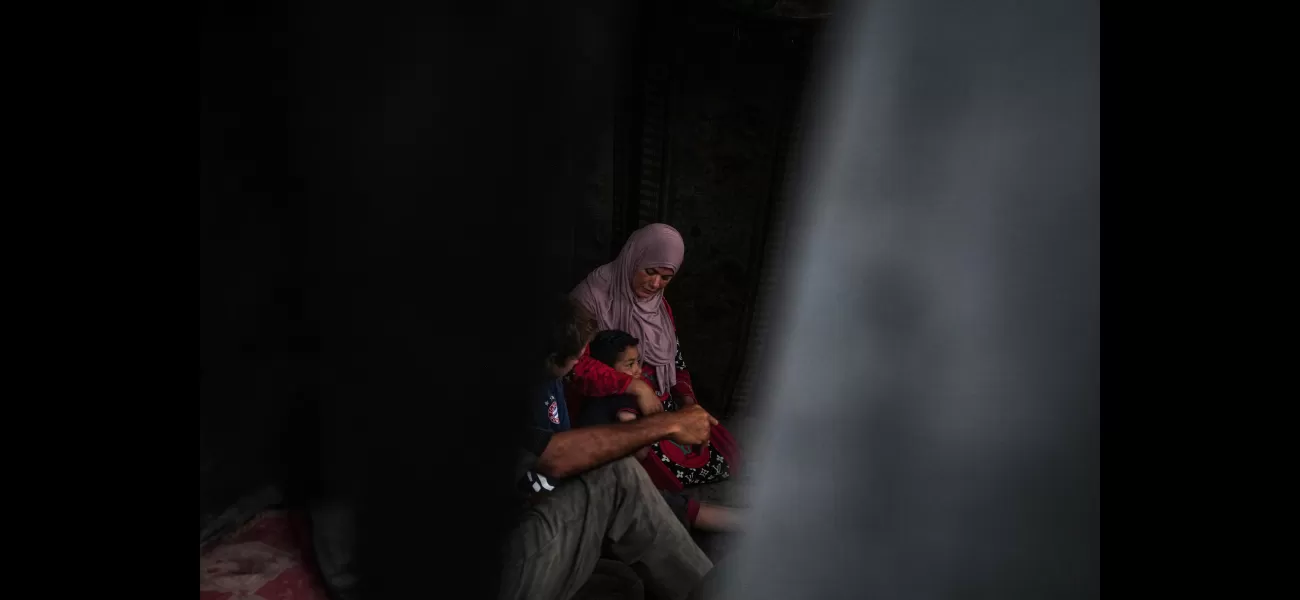Muslim holiday in Gaza brings reminders of war's devastating impact on families.
Last summer, Gaza celebrated Eid al-Adha properly, but this year, families will have to eat canned food in hot tents due to the ongoing war with Israel.
June 15th 2024.

In Deir al-Balah, a town in the Gaza Strip, last summer was a time of celebration for the Palestinian community. They were joyfully observing Eid al-Adha, a Muslim holiday filled with feasting, sharing, and gift-giving. Families gathered for large feasts, shared their meat with those in need, and dressed their children in new clothes. However, this year, things are much different. After eight devastating months of war between Israel and Hamas, the atmosphere is grim and filled with despair.
The war has taken its toll on the people of Gaza, leaving many families with little to no resources. Instead of the usual festivities, families are now forced to eat canned food in hot and stuffy tents. The local markets are scarce of meat and livestock, and there is no money for holiday treats or presents. War, hunger, and misery have replaced the once joyous atmosphere, and there seems to be no end in sight.
Nadia Hamouda, a mother who lost her daughter in the war and has been living in a tent in Deir al-Balah, sadly says, "There is no Eid this year." The call to prayer, which usually brings feelings of happiness and unity, now only brings tears and reminders of what has been lost. The Muslim community around the world will be celebrating Eid al-Adha, also known as the Feast of Sacrifice, in the coming days. This holiday commemorates the story of Prophet Ibrahim's willingness to sacrifice his son, as told in the Quran. In the Jewish and Christian traditions, Abraham is called to sacrifice his other son, Isaac.
Traditionally, even in the midst of poverty and isolation, the people of Gaza found ways to celebrate Eid al-Adha. They would decorate their homes with colorful decorations, surprise their children with treats and gifts, and share their meat with those who were less fortunate. Hamouda reminisces about the past, saying, "It was a real Eid. Everyone was happy, including the children." But now, after the war, most of Gaza is in ruins, and the majority of the population has been forced to flee their homes.
The war has resulted in the deaths of over 37,000 Palestinians, according to Gaza's Health Ministry. It has also destroyed much of the agricultural and food production in the area, leaving people dependent on humanitarian aid. However, this aid has been hindered by Israeli restrictions and ongoing fighting. As a result, the United Nations has warned that over a million people, almost half of the population, could face starvation in the weeks to come.
To make matters worse, the only route for Palestinians to enter or leave the territory, the Rafah crossing into Egypt, has been shut down. This means that most Palestinians from Gaza will not be able to make the annual Hajj pilgrimage, which usually takes place before Eid al-Adha.
Ashraf Sahwiel, a resident of Gaza City who is currently living in a tent, does not know when or if he will be able to return to his home. He shares, "We don't even know what happened to our houses or whether we'll be able to live in them again, or if it's even possible to rebuild." Another resident, Abdelsattar al-Batsh, explains the dire situation they are facing, "Today, there is only war. No money. No work. Our houses have been destroyed. I have nothing."
The war has caused severe shortages of both livestock and feed, driving up prices. Some local farms have even been turned into shelters, leaving farmers like Iyad al-Bayouk with no income. Mohammed Abdel Rahim, who has been living in a shelter on a former cattle farm, describes the challenging living conditions. In the winter, the shelter would smell like animals and be infested with bugs, but as the heat sets in, the ground dries out, making it more bearable.
Abdelkarim Motawq, who used to work in the local meat industry, says that this time of year was always busy and profitable. He would use his earnings to provide for his family, buying food, clothing, and gifts for his children. However, this year, due to the war, his family can only afford rice and beans. He reflects, "I wish I could work again. It was a busy season for me, during which I would bring money home and buy food, clothing, nuts, and meat for my children. But today there's nothing left."
As the people of Gaza struggle to survive amidst the destruction and devastation of war, the hope for a better future seems to be fading. Khaled, reporting from Cairo, captures the heartbreaking reality of the situation in Gaza.
The war has taken its toll on the people of Gaza, leaving many families with little to no resources. Instead of the usual festivities, families are now forced to eat canned food in hot and stuffy tents. The local markets are scarce of meat and livestock, and there is no money for holiday treats or presents. War, hunger, and misery have replaced the once joyous atmosphere, and there seems to be no end in sight.
Nadia Hamouda, a mother who lost her daughter in the war and has been living in a tent in Deir al-Balah, sadly says, "There is no Eid this year." The call to prayer, which usually brings feelings of happiness and unity, now only brings tears and reminders of what has been lost. The Muslim community around the world will be celebrating Eid al-Adha, also known as the Feast of Sacrifice, in the coming days. This holiday commemorates the story of Prophet Ibrahim's willingness to sacrifice his son, as told in the Quran. In the Jewish and Christian traditions, Abraham is called to sacrifice his other son, Isaac.
Traditionally, even in the midst of poverty and isolation, the people of Gaza found ways to celebrate Eid al-Adha. They would decorate their homes with colorful decorations, surprise their children with treats and gifts, and share their meat with those who were less fortunate. Hamouda reminisces about the past, saying, "It was a real Eid. Everyone was happy, including the children." But now, after the war, most of Gaza is in ruins, and the majority of the population has been forced to flee their homes.
The war has resulted in the deaths of over 37,000 Palestinians, according to Gaza's Health Ministry. It has also destroyed much of the agricultural and food production in the area, leaving people dependent on humanitarian aid. However, this aid has been hindered by Israeli restrictions and ongoing fighting. As a result, the United Nations has warned that over a million people, almost half of the population, could face starvation in the weeks to come.
To make matters worse, the only route for Palestinians to enter or leave the territory, the Rafah crossing into Egypt, has been shut down. This means that most Palestinians from Gaza will not be able to make the annual Hajj pilgrimage, which usually takes place before Eid al-Adha.
Ashraf Sahwiel, a resident of Gaza City who is currently living in a tent, does not know when or if he will be able to return to his home. He shares, "We don't even know what happened to our houses or whether we'll be able to live in them again, or if it's even possible to rebuild." Another resident, Abdelsattar al-Batsh, explains the dire situation they are facing, "Today, there is only war. No money. No work. Our houses have been destroyed. I have nothing."
The war has caused severe shortages of both livestock and feed, driving up prices. Some local farms have even been turned into shelters, leaving farmers like Iyad al-Bayouk with no income. Mohammed Abdel Rahim, who has been living in a shelter on a former cattle farm, describes the challenging living conditions. In the winter, the shelter would smell like animals and be infested with bugs, but as the heat sets in, the ground dries out, making it more bearable.
Abdelkarim Motawq, who used to work in the local meat industry, says that this time of year was always busy and profitable. He would use his earnings to provide for his family, buying food, clothing, and gifts for his children. However, this year, due to the war, his family can only afford rice and beans. He reflects, "I wish I could work again. It was a busy season for me, during which I would bring money home and buy food, clothing, nuts, and meat for my children. But today there's nothing left."
As the people of Gaza struggle to survive amidst the destruction and devastation of war, the hope for a better future seems to be fading. Khaled, reporting from Cairo, captures the heartbreaking reality of the situation in Gaza.
[This article has been trending online recently and has been generated with AI. Your feed is customized.]
[Generative AI is experimental.]
0
0
Submit Comment





